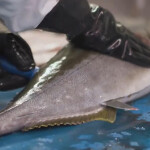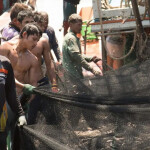Chris Williams is a fisheries expert with the International Transport Workers' Federation Fisheries Section.
The confirmation that forced labor and human trafficking is present in a U.K. fisheries improvement project (FIP) has once again highlighted the dire need for a reevaluation of FIPs as tools for safeguarding labor rights in the seafood industry.
The International Transport Workers’ Federation (ITF) successfully appealed against the labor and human rights claims made by the U.K. nephrops (scampi) FIP, revealing significant failures in the current framework of voluntary measures.
This case serves as a stark reminder that FIPs, despite well-intentioned efforts, are fundamentally inadequate in preventing and addressing labor abuses in fisheries. Indeed, they focus on the wrong level – the fishery – if they are going to detect problems that occur at the vessel or individual worker level.
FishChoice and FisheryProgress recognized the ITF’s claims, confirming the presence of forced labor and human trafficking within the U.K. scampi FIP. This acknowledgment underscores a critical flaw in the system: the inability of FIPs to provide credible assurances against labor violations.
The ITF's findings are alarming and indicative of widespread issues that extend far beyond this specific fishery.
Among the key findings from the U.K. scampi FIP are:
- Illegal employment practices: 62 vessels within the FIP were found to employ migrant fishers without U.K. work permits, in contravention of the U.K. Nationalities and Borders Act.
- Excessive work hours and unpaid overtime: 11 vessels were reported for forcing fishers to work excessive hours and unpaid overtime, in contravention of the International Labor Organization (ILO) Work in Fishing Convention (C188).
- Wage theft: 14 vessels were involved in withholding or delaying workers’ wages, amounting to wage theft.
- Illegal work agreements: 13 vessels failed to comply with ILO C188 by using illegal employment contracts (fishermen’s work agreements).
- Denied medical care: Four vessels failed to report accidents and denying medical care to injured fishers.
- Poor living conditions: Six vessels were reported for providing workers insufficient food, water, and unhygienic living conditions.
- Violence and retaliation: Crew on 12 vessels were involved in abuse, including bullying and death threats.
- Abandonment: Three vessels were reported for abandoning workers (non-payment of wages for over two months).
These violations illustrate that FIPs, which are designed to improve sustainability and ethical practices in fisheries, fall short of protecting the most vulnerable stakeholders – the workers.
The current model of FIPs does not ensure continuous, direct engagement with workers, a fundamental requirement for effective human rights due diligence (HRDD). This lack of engagement results in superficial assessments and inadequate responses to labor abuses.
The fundamental flaws of FIPs
FIPs are built on voluntary measures and guidelines that are non-binding and often lack enforcement mechanisms.
This framework places the burden of proof on the workers, who are already in precarious situations, to report abuses and seek remedies. Such an approach is not only ineffective but also perpetuates harm by failing to address power imbalances between workers and employers.
The reliance on social responsibility assessment tools like the social responsibility assessment (SRA) within FIPs exacerbates these issues. These tools are designed to translate audit results into risk assessments, but they often fail to capture the realities faced by workers, particularly when there is a lack of documented evidence.
This technical checklist approach aims to prove non-occurrence of issues rather than actively detecting and addressing them, misallocating resources and undermining worker engagement and empowerment.
A call for genuine reform
The ITF argues that meaningful change can only be achieved through measures that prioritize workers' rights and provide legally binding protections.
Collective bargaining agreements and binding agreements with genuine worker representation have proven successful in eliminating forced labor and achieving decent work conditions. These models emphasise the prevention of retaliation, the removal of immigration barriers, and the provision of meaningful remedies for workers.
The recent case of the UK scampi FIP underscores the urgent need for a paradigm shift in how labor abuses are addressed in the fishing industry.
Voluntary measures like FIPs are not enough. They create market fragmentation, exclude workers and entrench power imbalances, ultimately undermining trade union organizing and worker empowerment.
The way forward
The ITF is actively campaigning against the use of FIPs and similar certification schemes as assurances of ethical practices in fisheries.
We call on industry stakeholders to engage in open discussions about implementing measures that deliver real improvements for workers. This includes ending the reliance on FIPs as sourcing requirements or as providing assurances and, instead, adopting models that ensure direct, continuous engagement with workers, conduct root cause analyses to prevent recurring issues, and prioritize workers’ expertise in decisions that drive change across the industry.
It is time for a comprehensive overhaul of these initiatives. This is the only way we can ensure the protection the rights and wellbeing of workers, and in doing so, lock in a desperately needed shift towards more just and equitable seafood supply chains.







